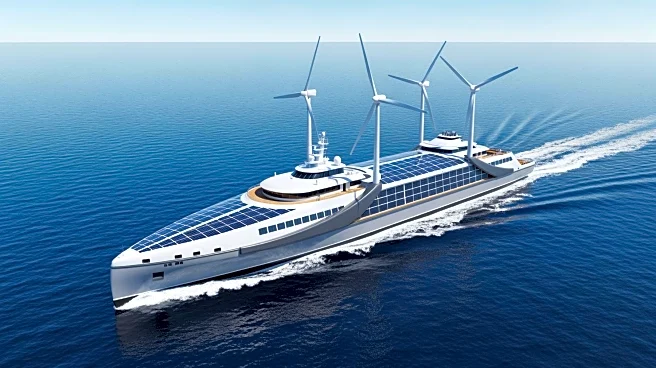What's Happening?
According to DNV's Alternative Fuels Insight (AFI) platform, October 2025 saw 30 new orders for alternative-fueled vessels. This includes 26 LNG-fueled vessels primarily from the container segment and four methanol-fueled vessels, three of which are tankers.
In total, 222 orders for alternative-fueled vessels have been placed in the first ten months of 2025, representing 52% of the orders placed in the same period in 2024. LNG-fueled vessels dominate the market with 147 orders, followed by methanol-fueled vessels with 47 orders. The container segment accounts for 65% of all new orders for alternative-fueled vessels in 2025. Additionally, four LNG bunker vessels and two bunker vessels capable of supplying methanol and biofuel were added to the orderbook in October, highlighting the importance of bunkering infrastructure for the growth of alternative-fueled fleets.
Why It's Important?
The increase in orders for alternative-fueled vessels signifies a shift in the maritime industry towards more sustainable practices. LNG and methanol are seen as cleaner alternatives to traditional fuels, reducing emissions and environmental impact. This trend is crucial as the industry faces pressure to meet international environmental standards and reduce its carbon footprint. The dominance of LNG-fueled vessels indicates a strong market preference, which could influence future investments and technological developments in the sector. The growth in alternative-fueled vessel orders also suggests potential economic benefits, including job creation in shipbuilding and related industries, as well as advancements in fuel technology and infrastructure.
What's Next?
The maritime industry is likely to continue investing in alternative fuels and bunkering infrastructure to support the growing fleet of alternative-fueled vessels. Stakeholders, including shipbuilders, fuel suppliers, and regulatory bodies, may focus on enhancing the efficiency and availability of these fuels. As the industry adapts to new environmental standards, further innovations in vessel design and fuel technology are expected. The continued expansion of the alternative-fueled fleet could lead to increased collaboration between international maritime organizations to establish uniform regulations and standards for these vessels.
Beyond the Headlines
The shift towards alternative-fueled vessels may have broader implications for global trade and environmental policy. As more countries adopt stricter emissions regulations, the demand for cleaner shipping solutions could drive international cooperation on climate change initiatives. This transition also poses ethical considerations regarding the balance between economic growth and environmental sustainability, challenging the industry to innovate responsibly.
















